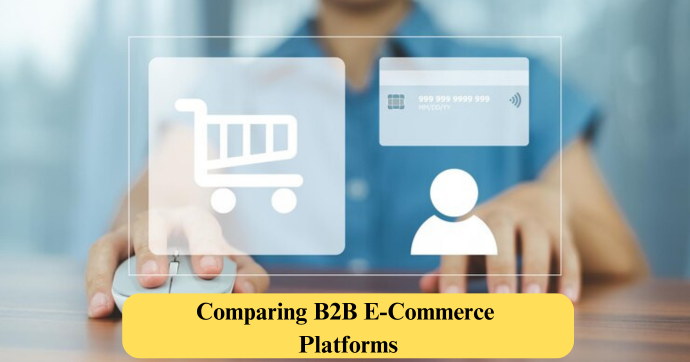The world of e-commerce is booming, and the B2B (business-to-business) sector is no exception. Companies of all sizes are embracing online platforms to streamline their sales processes, reach new markets, and expand their customer base. But with a multitude of e-commerce web development companies offering various B2B platform solutions, choosing the right one can feel overwhelming.
Fear not! This guide will equip you with the knowledge to navigate the options and select the perfect platform to build your B2B e-commerce empire.
Understanding B2B E-Commerce Needs: Distinct From B2C
Before diving into platforms, let’s acknowledge the key differences between B2B and B2C (business-to-consumer) e-commerce. B2B transactions often involve larger order quantities, complex pricing structures, and intricate customer relationships. Your ideal platform needs to cater to these specific B2B requirements.
- Why is a B2B eCommerce solution necessary for my business?
- What business models are you planning to implement?
- How many online stores and portals will you require?
- Which regions will your operations cover?
- What is expected sales volume, including order volume and product catalogue size?
- What essential functionalities must your eCommerce solution have?
- Is mobile compatibility a crucial requirement for your eCommerce site?
- What is your timeline for scaling up your operations?
- Which software integrations will you need?
- Can you address the requirements for a B2B eCommerce platform?
Here are some crucial features to consider when choosing a B2B e-commerce platform:
Product Catalog Management: B2B businesses might have complex product catalogs with variations, configurations, and different pricing tiers for various customer segments. The platform should allow for efficient management of this data and offer customizable product pages with detailed information.
Advanced Order Management: B2B orders can involve repeat purchases, custom quotes, and negotiated pricing. Your platform needs robust order management functionalities to handle these complexities smoothly.
Customer Relationship Management (CRM) Integration: Many B2B businesses rely heavily on CRM systems to manage customer relationships. Seamless integration between your e-commerce platform and your CRM is essential for a unified customer experience.
Security and Scalability: B2B transactions often involve sensitive information and large order values. The platform must prioritize security with robust data encryption measures. Additionally, consider scalability – choose a platform that can adapt and grow as your business expands.
When businesses seek a B2B ecommerce platform, vendors often assure them that their solution will meet all their needs. However, each B2B solution is unique, and the right choice depends heavily on the business’s specific requirements, innovation needs, and financial capacity for ecommerce.
Read Also-: Why Do You Need an E-commerce Marketing
Popular B2B E-Commerce Platforms: A Comparative Look
Now that we understand the core B2B needs, let’s explore some popular e-commerce platforms and their strengths:
Magento Commerce (Adobe Commerce):
A powerful and customizable platform, ideal for large B2B businesses with complex product catalogs and high-volume transactions. Its scalability and extensive functionalities come at a premium cost.
BigCommerce:
A user-friendly platform with built-in B2B features like customer groups, tiered pricing, and advanced search functionalities. It offers a good balance between affordability and scalability, making it suitable for businesses of various sizes.
Salesforce B2B Commerce:
Tailored for businesses already using Salesforce’s CRM system, this platform offers seamless integration and advanced features for managing complex B2B workflows. However, it can be a costly option for businesses not already invested in the Salesforce ecosystem.
OpenCart:
An open-source platform offering a high degree of customization but requiring more technical expertise for setup and maintenance. It can be a cost-effective option for businesses with development resources in-house.
This is not an exhaustive list, but it highlights some of the leading B2B e-commerce platforms with distinct advantages. Carefully analyse your specific needs, budget, and technical capabilities before making your choice.
Partnering With an E-Commerce Development Expert
The first step would be Choosing the right platform. To truly unlock the potential of your B2B e-commerce platform, consider partnering with a skilled ecommerce web development company. These professionals possess the expertise to:
Platform Customization: They can customize your chosen platform to fit your unique business requirements, optimizing features and workflows for your B2B operations.
Integrations: They can ensure seamless integration of your e-commerce platform with your existing CRM, ERP (Enterprise Resource Planning), and other business systems.
Mobile App Development: Consider a company that offers e-commerce mobile app development services to provide your B2B customers with an additional convenient way to browse products, place orders, and manage accounts.
Ongoing Support and Maintenance: A reliable development partner will provide ongoing support and maintenance to ensure your platform functions smoothly and remains secure.
So, how do you choose a B2B ecommerce platform? To ensure your business can handle any market changes, first, understand what B2B ecommerce entails and identify the type of platform your business requires. Then, find a solution that can scale your ecommerce capabilities cost-effectively, adapt to all market demands, and allow for regular vendor updates.
Wrapping-up
Choosing the right e-commerce development service can make a world of difference in the success of your B2B online venture. Look for a company with experience in building B2B platforms, a strong understanding of your specific industry, and a focus on providing personalized solutions that meet your unique needs.
Read More-: How to Find the Top Web Development Company in India








